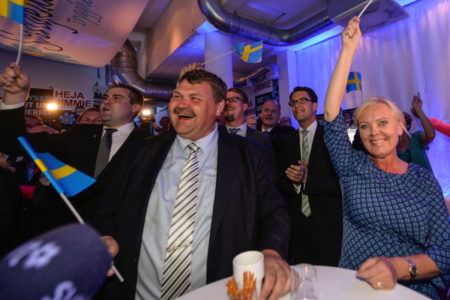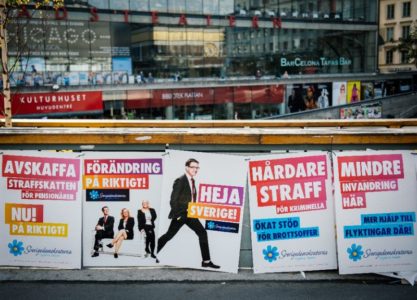Take a Chance on Me
Sweden Democrats join the ECR

Sweden Democrats MEPs (Jnytt)
Summer has arrived everywhere, including to Brussels. It seems that before the long-awaited summer break, or at least before the upcoming World Cup matches, everyone wants to finalise their business. No exception here is the European Parliament, and the political groups that are now heavily preparing for the next year’s European elections. This week’s plenary session in Strasbourg, the last one before the summer break, brought us some interesting and maybe not so surprising news.
The notoriously nationalistic, anti-immigrant and Eurosceptic Sweden Democrats have announced this week that they have joined the political group of the European Conservatives and Reformists (ECR), moving on from the Europe for Freedom and Direct Democracy (EFDD), an anti-EU mixture of populists, Nigel Farage, and the usual right-wingers. Now, the Sweden Democrats will be a part of a political group that is a mixture of the UK Conservative Party MEPs, strongly free market and pro-NATO, with Eastern European economic and social nationalists such as the Polish governing party PiS. Although probably every political group in the European Parliament is criticised for having some member parties that are not so committed to the group values, this is a striking example of what not to mix.
What can one conclude from this party transfer? First of all, we need to take into account the fact that Sweden has national elections in September, ahead of European elections which will take place next May. Sweden is currently led by a left-wing minority government, and opinion polls are showing strong numbers for the Sweden Democrats, which could end up forming a government with some moderate forces from the right, à la Austria. That would also end the current cordon sanitaire the Sweden Democrats are facing in the Swedish Parliament.

Sweden Democrats election posters (Yahoo)
Second of all, it is quite obvious by now that some sort of Brexit is bound to happen next year. Hence, the ECR group (which was basically formed by the previous Tory leader David Cameron, who left the centre-right EPP because it was too pro-EU for him) needs some reinforcement immediately, in order to sustain its presence in the European Parliament, where it is the 3rd largest political group and takes the opportunity to influence EU legislation. Although the UK Conservative Party members voted against the decision, now we have a situation that the governing UK party is in a European political group with some deeply negative and radical figures.
Needless to say, the whole situation did not end up unnoticed. Dutch liberal MEP Sophie in’t Veld criticised the decision and asked the Tories if they are actually comfortable of sitting in the same group with the far right. But then again, her group leader Guy Verhofstadt wanted to bring the Italian Five Star Movement on the liberal boat, which ended up as a complete failure. Finally, one needs to take into account that by now, the mutual actions of some political groups seem to constantly normalise the far-right discourse and representatives. It seems that there will be a strong post-Brexit presence of at least two right-wing and Eurosceptic groups, one of them gathering around ECR, and probably another one among some more radical examples. The good news is that there is always someone to point it out and monitor them.
